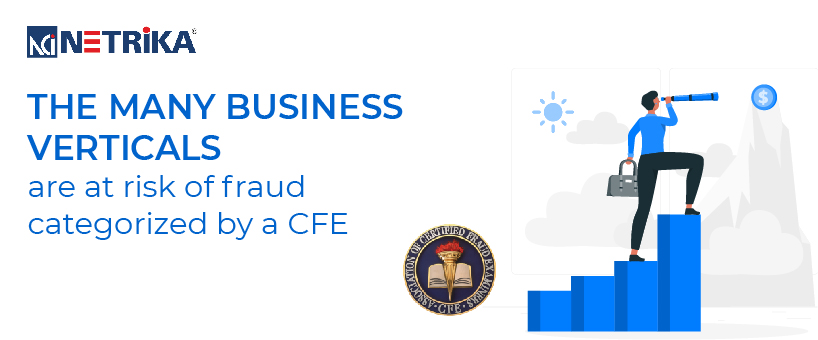Categories of fraud investigation addressed by CFEs
- April 28, 2022
- Posted by: marketing@netrika.com
- Category: Blogs

Does fraud affect a section of a business or swallow all its verticals? Let’s find out!
As scamsters continue their trail of drilling vulnerable holes in business sections, fraud examiner certifications garner a more advanced approach to enable streamlined and transparent investigation. With technological disruption swaying the global marketplace, the expansion and intrusion of frauds in every business section are becoming more common and practically inevitable.
While frauds extrapolating from a finance perspective and targeting the account firms is still favoured for apparent reasons, scams are now expanding their steps to departments or businesses in the most sophisticated form. Fraud examiner certification focuses on this diversifying nature of scams and accepts that they will happen, despite the most cutting-edge technology and the most reliable human resource. Hence, the emphasis on fraud investigation with defined strategies is categorized based on the attacked business vertical.
While fraud is the act of deceiving and attacking someone else’s vulnerability for personal or professional gain, fraud investigation identifies whether the fraud has occurred. Moreover, fraud examiner certification enables a collection of data on fraud, and evidence that relates to it, and creates a protective shield to minimize damage and protect all the scam victims.
For instance, if a business makes a specific claim about a product or service and does not deliver that as affirmed, the company is guilty of fraud. In the same way, if a malicious person is masquerading as a reliable and diligent employee to steal confidential documents or make the business system and network vulnerable to fraudsters, then the employee is guilty of fraud.
What Happens During Fraud Investigation by CFEs?
Fraud investigation commences with close interaction between the client and the investigator, internal or external. In most cases, the study moves to the certified fraud examiner launching an investigation, whereby the suspect is guilty of deceit and supporting evidence is discussed. Fraud examiner certification also suggests digging deep into the evidence through asset search, surveillance, employee investigation, background search and business investigations.
Considering one of the most vital aspects of the CFE’s role of investigating frauds based on extracted data on different fraud categories, the certified fraud examiner uses a response team to bring forth as much detail as pertinent.
The categories that are listed under the CFE’s targeted verticals to determine the impact, if any, are:
Fraud Investigation categories
● Fraudulent Financial Reporting
Also known by the intentional misinterpretation of a business’s financial statements, to misguide the investors about their profitability and performance. Fraudulent financial reporting is quickly becoming the leading light in the world of frauds that ropes in finances from investors and leads them to incur millions of losses.
● Corruption and Theft of confidential organizational information
Both crime and theft of an organization’s data have been among the highest intensity frauds, intending to dent the business reputation and breed on the stolen information for financial benefits.
While corruption incorporates the abuse of power and position for capital gain, theft is intervening in the vulnerable spots of business, to benefit. While both the contributing factors come from within the organization, theft can sometimes be purely an external force.
Fraud examiner certification enables a CFE to draw strategies to lower or avert the impact of stolen data and corruption, hence rescuing the business from reputation loss.
● Insurance and Health Care Fraud
Healthcare, being on the top of the worst-hit list of data security breaches due to its lack of protective gear, is also posing the biggest risk to its customers. The Healthcare industry has the largest database of patients’ information, and a potential leak is a major threat to the personal data of billions of people across the globe.
According to a report by Protenus Breach Barometer, the Healthcare and Insurance Industry in 2019, was the victim of stolen records that accounted for a whopping 41.4 million. This figure continues to rise despite COVID-19 bringing the globe to a stand-still.
● Disbursement Fraud
The most common type of asset misappropriation, disbursement fraud occurs when an employee of the company, uses their position and stature to create a payment for inappropriate purposes. These are commonly known as on-book fraud schemes, where cash or check leaves the company, creating a transaction trail with a record on books.
Disbursement fraud can be further categorized into three domains: shell companies, pay-and-return schemes, and personal purchases with company funds.
● Tax Fraud
A fraud that we hear not just on media news, but in our circle too, where a business or individual committed tax fraud or in simple terms falsified information on a tax return. This type of fraud not just garners a fraud investigator with certified fraud certification, but also high government interest, which gives it the attention of most headlines.
Tax fraud entails that an individual or a business (usually individual or small-size entities) has cheated on their tax returns, to avoid paying the complete tax obligation.
The size and intensity of tax fraud are so huge, that the largest reported tax fraud was calculated averaging at $1.5million. Tax frauds include people to temper with the supporting documents. The magnanimity of tax evasion is given the tag of the most serious crime, referred to as a felony.
● Identity Theft
A study by FTC highlights that every 14 seconds, someone becomes a victim of identity theft. This fast momentum fraud happens when someone masquerading as another honest individual, uses their personal information to apply for a loan, credit card, bank withdrawals, insurance etc to gain benefits.
● Internet Fraud
Internet fraud is one of the most sophisticated frauds, rising on the ladder of gaining high visibility into an individual or company’s data, finances, and documents. It occurs when fraudsters target victims over the internet and use various tactics such as phishing, deep flakes, virus etc, to steal personal information or transactions data to cause significant capital loss.
● Expense Claim Fraud
Expense claims are the costs that an employee incurs for work purposes, which can be paying for hotels while on a business trip, lunching with a customer or vendor professionally etc. A fraud in expense claim happens when the employee falsely claims for such expenses while staying in less expensive hotels or motels or increases these expenses from their original cost causing receipt forgery. They claim the company for the entire expense and keep the remainder to themselves.
● Theft of Inventory
A common practice in businesses, considering that every business has either a product-based or service-based structure with an inventory of expensive and as small as stationery items. Inventory theft includes employees stealing products from the store or ordering more than the requirement. Sometimes employees stoop to the of claiming the products to be expired so they can use them personally.
Why does your business need a certified fraud examiner?
If your business is a victim of fraud, and it is likely to lose both capital and reputation due to that, then your business is in urgent need of a certified fraud examiner.
Netrika collaborates with ACFE India to become the only authorized CFE training partner in India to offer the fraud examiner certification course across industry verticals to ease this process. We are a global leader in providing specialized training regimes from experts in the respective areas of specialization with extensive industry exposure.

